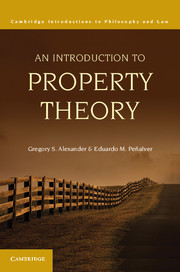Book contents
Preface
Published online by Cambridge University Press: 05 June 2012
Summary
Preface
Property theory has undergone something of a renaissance of interest within the legal academy over the past several years. The field has become the site of major disputes concerning both the conceptual nature of ownership and its normative underpinnings. In part, this revival of interest reflects broader social, political, and economic developments. These include controversies surrounding the government’s use of its eminent domain power, debates over the state’s power to regulate and tax owners, and the dramatic increase in the economic importance of intellectual property assets. Within these arguments, people have (at times implicitly) relied upon divergent understandings of the normative foundations and meanings of ownership.
Property theory can be a daunting topic. For students encountering the subject for the first time, the classic texts in the field are often incomprehensible and the arguments inaccessibly abstract. A common reaction when students are introduced to these sources during the first-year property course is, why bother? There is very good reason to bother. Theory matters. At the base of every single property debate are competing theories of property – different understandings of what private property is, why we have it, and what its proper limitations are. In these disputes, theory as such may not be explicitly articulated, but it is always near the foundation of the disagreement.
- Type
- Chapter
- Information
- An Introduction to Property Theory , pp. xi - xiiPublisher: Cambridge University PressPrint publication year: 2012



